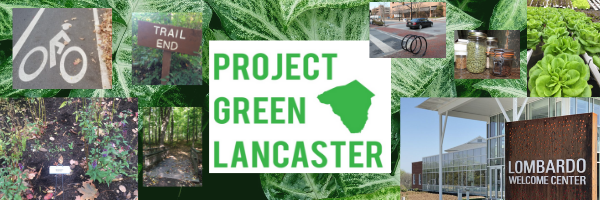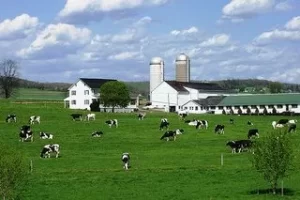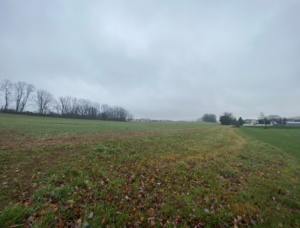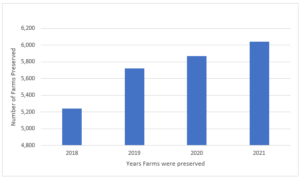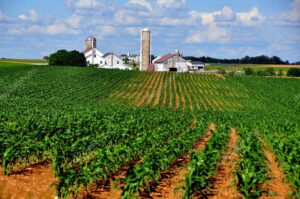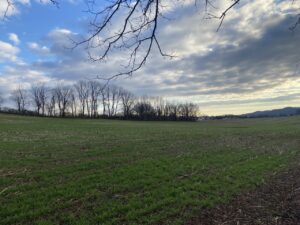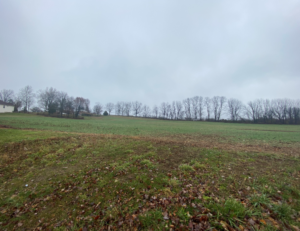We have some of the richest soil in the world. Why waste it?
By Chris Heller
Living in Lancaster County the smell of cow manure should come to no surprise. Lancaster county is home to some of the richest and most productive soil in the world. Which means we should be using it to our advantage. Farming is deeply rooted in Lancaster county heritage and the community plans to keep it that way. The farms here do a lot more than just grow corn. Lancaster farms Help Protect watersheds, recharge groundwater, and control flooding. While open farm fields Help Improve air quality and help provide food and shelter for wildlife in the area. Farms in Lancaster also bring in an additional income of $6.7 billion per year. Farms not only account for 21% of Lancaster’s economy but also account for 2% of the workers in Lancaster. To say farms are a huge part embedded in Lancaster’s history is an understatement.
Where Lancaster is ranked in the country
- Number 4 county in the US in production of poultry and eggs
- Number 10 county in the US in production of milk from cows
- Number 7 county in the US in animal sales ($1.3 billion)
- Pennsylvania has had the fastest growth in organic commodity sales from 2012 to 2017
Farms in Lancaster County in 2020
- 58,720 jobs are jobs are 17.21% of the total workforce
- $2,251,329,578 is 13.71% of all earnings
- $10,644,868,169 billion in ag sales is 20.44% of the total gross regional product
- Agricultural land is 65% of Lancaster County Ecosystem and generated $483 million in annual ecosystem service benefits
- Agriculture Land is 65% of Lancaster County Eco System and generates $483 million in annual ecosystem service benefits
- $580 million in tourism of agriculture
- 1st county in nation to reach 100,000 acres of preserved land
The average size of a farm in Lancaster county is 77 acres. Agriculture here provides a massive amount for the county. The Market value of agricultural products in Lancaster is $1.5 Billion. Lancaster has an estimated 5,108 farms throughout the country and 99% of them are family owned. Although 5,108 farms may seem like a lot, that number is down 10% since 2012. One of the biggest problems that farmers in Lancaster deal with is losing their land to malls, developments, business buildings, and more. There are 300,000 acres of farmland that is unprotected in Lancaster County. Every year over 1,200 acres of land are lost to the construction of developments. With the number of farms decreasing every year there is concern about how much farmland we can actually lose. Lancaster Farmland Trust is a program focused on preserving farmland and protecting farm owners for generations to come.
Lancaster Farmland Trust
Lancaster Farmland Trust is invested into making sure that all farmers including Amish, Mennonite, and English don’t lose their land. Lancaster Farmland Trust’s goal is to preserve farmers’ land for generations to come. How they achieve this is by a formal document called conservation easement. A conservation easement is a legal voluntary agreement that limits the use of land and protects its conservation values permanently. Lancaster Farmland Trust keeps the original landowner’s purpose of keeping the farm for agricultural use only.
Conservation easement benefits
- Lower cost to land trust and public agencies
- Landowners retain several private property rights
- May provide tax benefits to landowners
- Provide economic benefits to the area
- Do not automatically make property make properties open to the public
Purpose of preservation
Having farmland preserved allows for the land to stay open and keep farming there. This allows for farmland to keep providing things forever. This is important to be able to sustain food and other products right here in our country. Without the preservation, farmers could lose valuable land that helps feed our communities. Preserving farmland prevents a snowballing effect that could tank the farming industry in a community. Losing a non-preserved farm could be damaging to the economy in that community. Having anchor farms that are permanent allows for non-preserved farms to be lost without collapsing the farming industry in that community.
Finding Farmers
Finding farmers that are interested in the program is not a hard process. Lancaster Farmland Trust has had a waitlist with over 50 names since 2014 with eager farmers waiting to get their preservation documents. The easiest way for Lancaster Farmland Trust to reach customers is by word of mouth. Working with farmers in the area leads to neighbors and other people in the community learning and wanting to get involved. Lancaster Farmland Trust also gets involved in summer field days and winter farmer meetings to explore new opportunities.
Timeline:
- 1980 – A nine members agricultural
board was assigned by Lancaster
County commission in order to
preserve farmland.
- November 13th, 1985 – Amos Funk
And Marilyn Ware held their first
meeting for their newly created
organization Friends of Agricultural
Land Preservation.
- August 1988 – Friends of Agricultural
Land Preservation changed their name
to Lancaster Farmland Trust.
- 1990 – Lancaster Farmland Trust
preserved 14 farms and over
1,000 acres of farmland.
- 2011 – In 2011 alone Lancaster
Farmland Trust Preserved 22 farms
and over 1,239 acres of Farmland
- September 20th, 2018 – Lancaster
Farmland Trust celebrates 30 years
with over 30,000 acres of farmland
preserved.
Understanding the Process of Preservation
- Explain terms of standard easement
- Discuss landowners short- and long-term goals
- What preservation means
- Formal review process that is voted on by board of trustees
Due Diligence Steps
Before the preservation process starts Lancaster, Farmland Trust has some due diligence steps. First, they provide a final draft of the easement to their legal counsel and to the landowner for them to review. It is encouraged that the landowner seeks his own legal counsel to get from tax advice or financial planner. Next They review the exciting legal property deed and enforce a property boundary survey if needed. If it is needed Lancaster Farmland trust would hire a surveyor. Then they would conduct a thorough title search of the property to see if there are any concerns. The final step of the process is the settlement meeting. Staff from Lancaster Farmland Trust meet with the farmer to sign the easement.
After preservation
Once the preservation is finalized the landowners farm is protected forever. The binding agreement will last through generations and landowners. Lancaster Farmland Trust keeps in contact throughout the year through phone calls, mailings, and a one time on farm visit. During these meetings landowners can ask questions while Lancaster Farmland Trust answers questions and does property checks. Under the circumstance that the landowner decided to sell the farm Lancaster Farming Trust would be involved in the sale. This is so the new landowner understands what it is to acquire a preserved farm. Lancaster Farmland Trust then creates a relationship with the new landowner.
Amos Funk Stewardship Fund
The Amos Funk Stewardship Fund provides the needs and resources for Lancaster Farmland Trust to continue to
- Monitoring farms
- Answering questions regarding constructing new improvements
- Executing a permitted subdivision
- Educating new owners of preserved properties
- Preventing or resolving easement violations
Without these resources Lancaster Farmland Trust wouldn’t be able to continue to provide preservations for farm owners in Lancaster. Preservations are a legal binding agreement along with a moral obligation to protect landowners and members of the community.
Jeffrey Swinehart – Lancaster Farmland Trust CEO
Jeffrey Swinehart is the current CEO of Lancaster Farmland Trust. Before taking over as CEO Swinehart has worked with Lancaster Farmland Trust for a number of years. Swinehart served as the Deputy Director for 13 years, and also served as the Chief Operating Officer for 3 years. As CEO Swinehart is responsible for creating and executing strategic policies for the board to trustees. During his time working at Lancaster Farmland Trust Swinehart has helped contribute to over 500 easements and over 30,000 acres of preserved farmland. Swinehart is also involved in WeConservePA where he is a member, Manheim Township Planning Commission where he serves as a chairman, and Lancaster Clean Water Partners where he is a chair member.
Gordon Hoover – Agricultural Outreach Coordinator
Gordon Hoover serves as the Agricultural Outreach Coordinator for Lancaster Farmland Trust. Hoover works to improve water quality and environmental stewardship throughout Lancaster County by working with stakeholders, farmers, and federal officials. Hoover currently works as the supervisor for Salisbury Township, Lancaster Clean Water Partners Committee, and is a church school teacher. Before joining the Lancaster Farmland Trust team Hoover gained experience working as the Director of Dairy Member Relations for Land O’ Lakes, and as the Conservation Coordinator for Salisbury Township. Hoover also assisted his wife in operating Welsh-Vista farms in Salisbury Township. Hoover is proud of his hard work in the agriculture field, one he has been a part of for over 60 years.
Montgomery County Preservation
Montgomery County Preservation is another program located in Pennsylvania that is dedicated to preserving farmland in Montgomery County. The goal of Montgomery County Preservation is to acquire easements of well rounded established farmland. After acquiring an easement of farmland, that farmland then becomes preserved which means that the land will remain for farming purposes forever. If the owner of the farmland wishes to sell the land, they may do so but the new owner must understand that the land stays farmland. Montgomery County Preservation will then work with the new owner on preserving the land. Montgomery County Preservation has helped preserve over 181 farms and over 10,372 acres of land throughout Pennsylvania.
Preservation Options
To preserve farmland in Pennsylvania, farm owners have 2 options for keeping their land for farm use only. The Agricultural Conservation Easement Purchase Program is the first option for preserving farmland. This option focuses on protecting farmland by purchasing easements of land from farm wonders who wish to keep their farm for agricultural use only. This option relies on voluntary owners who are eager to join the program. There are currently 57 different counties involved in the program. The second option for preserving farmland is through private charitable land trusts. A land trust is a charitable organization that plans on acquiring land conservation easements for different purposes such as preserving farmland for agriculture, improving water quality, protecting natural habitats, and more. Like the Agricultural Conservation Easement Purchase Program, these charitable organizations work with the land owners in efforts to help protect their land for agricultural purposes only.
Sources
Economic impact. Lancaster County Agriculture Council. (2021, March 15). Retrieved November 22, 2022, from https://www.lancasteragcouncil.com/economic-impact
Economic impact. Lancaster County Agriculture Council. (2021, March 15). Retrieved November 22, 2022, from https://www.lancasteragcouncil.com/economic-impact#:~:text=Lancaster%20County%20Agriculture%20by%20the,Lancaster%20County%20are%20family%20owned.
Hawkes , J. (2019, April 15). USDA census shows Lancaster County Agriculture in Transition. Lancaster Farming. Retrieved November 22, 2022, from https://www.lancasterfarming.com/farming-news/usda-census-shows-lancaster-county-agriculture-in-transition/article_f7293b74-5f80-11e9-a9f6-2724d64782d9.html#:~:text=Fewer%20farms,-So%20are%20farmers&text=It%20notes%20a%209.7%25%20decline,drop%20in%20just%20five%20years.
Preservation. Lancaster Farmland Trust. (2021, January 27). Retrieved November 22, 2022, from https://lancasterfarmlandtrust.org/preservation_page/preservation/
Why preserve farmland? ConservationTools. (n.d.). Retrieved November 22, 2022, from https://conservationtools.org/guides/147-why-preserve-farmland
Lancaster Farmland Trust helped preserve 1,239 acres in 2011. Lancaster Farming. (2012, March 3). Retrieved December 5, 2022, from https://www.lancasterfarming.com/farming-news/lancaster-farmland-trust-helped-preserve-acres-in/article_c00efc98-1130-5bf9-9342-4b995c6a1b2a.html
What is a land trust? ConservationTools. (n.d.). Retrieved December 6, 2022, from https://conservationtools.org/guides/150-what-is-a-land-trust
Farm Preservation Options for landowners. ConservationTools. (n.d.). Retrieved December 5, 2022, from https://conservationtools.org/guides/148-farm-preservation-options-for-landowners
